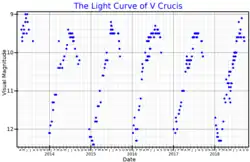| Observation data Epoch J2000.0 Equinox J2000.0 | |
|---|---|
| Constellation | Crux |
| Right ascension | 12h 56m 35.559s[2] |
| Declination | −57° 53′ 57.02″[2] |
| Apparent magnitude (V) | 8.74 - 11.13[3] |
| Characteristics | |
| Spectral type | Ce(Ne)[4] |
| Variable type | Mira[4] |
| Astrometry | |
| Radial velocity (Rv) | −19.90[5] km/s |
| Proper motion (μ) | RA: 0.507[2] mas/yr Dec.: 1.989[2] mas/yr |
| Parallax (π) | 0.7451 ± 0.0475 mas[2] |
| Distance | 4,400 ± 300 ly (1,340 ± 90 pc) |
| Absolute magnitude (MV) | -4.67[6] |
| Details | |
| Radius | 130[2] R☉ |
| Luminosity | 7,244[7] L☉ |
| Temperature | 3,075[7] K |
| Other designations | |
| Database references | |
| SIMBAD | data |
V Crucis is a carbon star in the constellation Crux. A Mira variable, its apparent magnitude ranges from 8.7 to 11.1 over 376.5 days.[4] The fact that this star's period is nearly equal to one year makes it hard to get good observational coverage over the entire cycle. Its near-infrared light curve shows a contribution from the first harmonic of the fundamental period.[9]
References
- ↑ "Download Data". aavso.org. AAVSO. Retrieved 1 October 2021.
- 1 2 3 4 5 6 Brown, A. G. A.; et al. (Gaia collaboration) (August 2018). "Gaia Data Release 2: Summary of the contents and survey properties". Astronomy & Astrophysics. 616. A1. arXiv:1804.09365. Bibcode:2018A&A...616A...1G. doi:10.1051/0004-6361/201833051. Gaia DR2 record for this source at VizieR.
- ↑ Pojmanski, G. (2002). "The All Sky Automated Survey. Catalog of Variable Stars. I. 0 h - 6 hQuarter of the Southern Hemisphere". Acta Astronomica. 52: 397–427. arXiv:astro-ph/0210283. Bibcode:2002AcA....52..397P.
- 1 2 3 "V Crucis". AAVSO Website. American Association of Variable Star Observers. 4 January 2010. Retrieved 2019-12-11.
- ↑ Gontcharov, G. A. (2006). "Pulkovo Compilation of Radial Velocities for 35 495 Hipparcos stars in a common system". Astronomy Letters. 32 (11): 759–771. arXiv:1606.08053. Bibcode:2006AstL...32..759G. doi:10.1134/S1063773706110065. S2CID 119231169.
- ↑ Guandalini, R.; Cristallo, S. (2013). "Luminosities of carbon-rich asymptotic giant branch stars in the Milky Way". Astronomy and Astrophysics. 555: A120. arXiv:1305.4203. Bibcode:2013A&A...555A.120G. doi:10.1051/0004-6361/201321225. S2CID 54918450.
- 1 2 Bergeat, J.; Knapik, A.; Rutily, B. (2002). "Carbon-rich giants in the HR diagram and their luminosity function". Astronomy and Astrophysics. 390 (3): 967–986. Bibcode:2002A&A...390..967B. doi:10.1051/0004-6361:20020525.
- ↑ "V Cru". SIMBAD. Centre de données astronomiques de Strasbourg. Retrieved 2019-12-11.
- ↑ Whitelock, P. A.; Feast, M. W.; Marang, F.; Overbeek, M. D. (June 1997). "Mass-loss variations among carbon-rich AGB variables". Monthly Notices of the Royal Astronomical Society. 288 (2): 512–532. Bibcode:1997MNRAS.288..512W. doi:10.1093/mnras/288.2.512.
This article is issued from Wikipedia. The text is licensed under Creative Commons - Attribution - Sharealike. Additional terms may apply for the media files.
